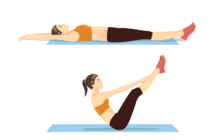They say exercise improves the mind and, here at Short Motivation, we feel far more energised if we can get up early and exercise before we start our day. Even better through the summer season when you can join an outdoor bootcamp.
Problem is, you can over-exercise and the type and style can affect your well-being. We’ll be fair and say one-half of Short Motivation experiences this playing 11-a-side football once-a-week. The heart is willing, but the body struggles with 90 minutes of constant running and, as a result, the mind suffers. You know you can’t really perform for 90 minutes, but each week you put yourself through the motions, resulting in tiredness for days after.
Researchers at Yale University looked into how 1.2 million people kept fit and compared the results to whether they said they were stressed, depressed or, of course, happy. People who did no physical activity claimed they felt low for 3.4 days, whereas people who exercised regularly, reported almost half this, at 2 days of feeling low, or a reduction of 43 per cent.
But, people who exercised for over 90 minutes or came away exhausted suffered almost the same as those who didn’t exercise at all – most probably as their body struggled to recover, felt they’d overdone it and pushed themselves too far. Knowing your body is key and it’s easy to feel like you can achieve the same level of activity at 45 as you could at 25. You can’t.
Dr Adam Chekroud, Assistant Professor of Psychiatry at Yale University, who led the research, said “previously, people have believed that the more exercise you do, the better your mental health, but our study suggests that this is not the case. Doing exercise more than 23 times a month, or exercising for longer than 90-minute sessions is associated with worse mental health.
“It’s difficult to speculate what is driving the effect. It is easy to imagine why someone might have poor mental health if they are exercising more 6 or 7 days per week. They could be getting run down (physically exhausted) or burned out (mentally), both of which might make them feel stressed or depleted.”
The research also found that the biggest mental health benefits came from team sports such as football, cycling and outdoor bootcamps. By exercising and enjoying the moment with others brought down the number of poor mental health days by 22.3 per cent over the month.
Of course, how you exercise is a personal choice. Whereas one person might prefer to be in the gym, headphones on, working out on their own, another person may prefer to be with their mates competing in a team. The important part of the research is to know your limits and do not over-exercise. We all know people who are ‘addicted’ to exercise, but secretly those people do not feel like they are ever doing enough, feel like they could be doing more and that negativity increases as you age as your body can’t do as much as it achieved 20 years ago.
Try and exercise for 30 minutes 3-5 times a week, do something you really enjoy, get outside if you can and make sure your body gets enough rest between the type of exercise.




